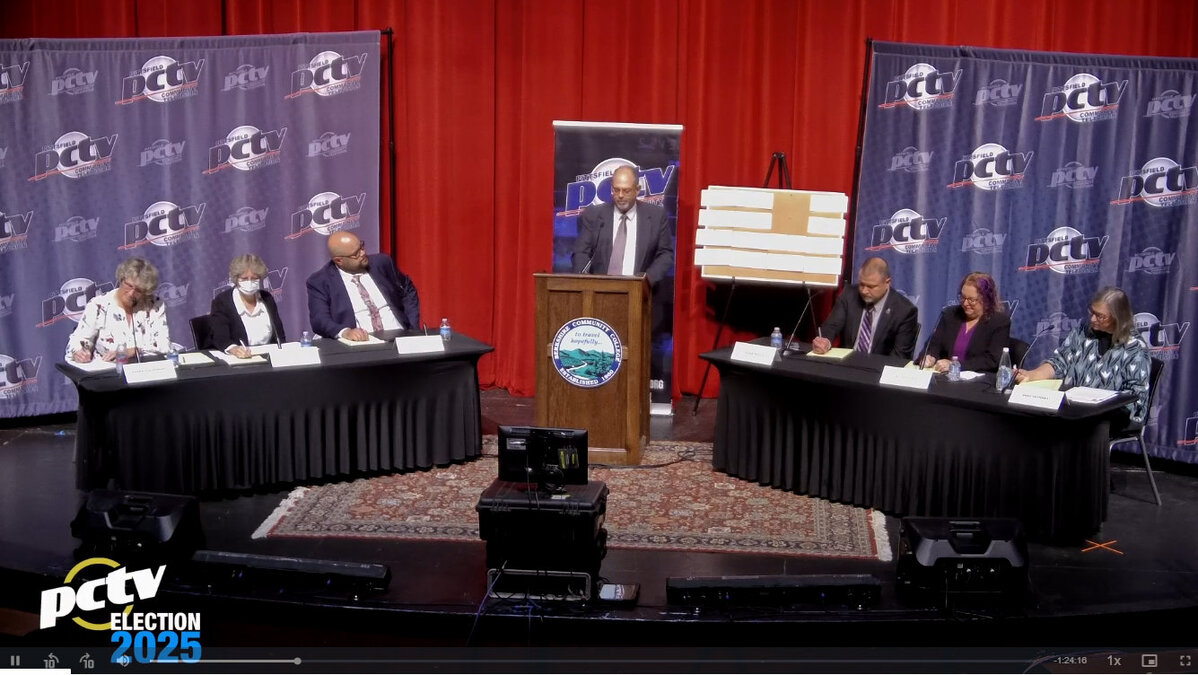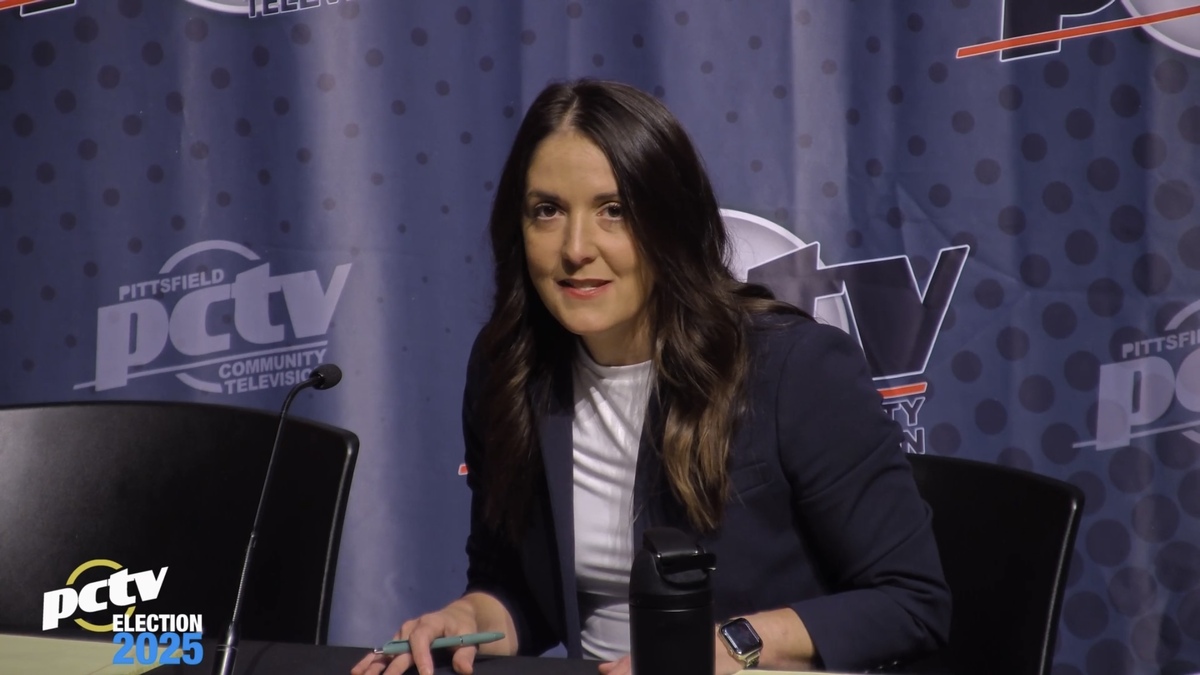Pittsfield Ward 6, At-Large Candidates Weigh in on HomelessnessBy Brittany Polito, iBerkshires Staff
06:23PM / Wednesday, October 22, 2025 | |
 PCTV's Shawn Serre moderates Thursday's debate for councilors at large in the Boland Theater at BCC in this screenshot. PCTV's Shawn Serre moderates Thursday's debate for councilors at large in the Boland Theater at BCC in this screenshot. |

Dina Lampiasi, running for re-election in Ward 6, answers questions in this screenshot. Her challenger, Walter Powell, was unable to attend.
PITTSFIELD, Mass. — Candidates for Ward 6 and councilors-at-large weighed in during last week's debates on the city's struggle with homelessness and how to move forward with effective solutions.
Dina Lampiasi, incumbent candidate for Ward 6, feels that the median and camping ordinances are not a proper way forward and that they fail to address the actual problem. She said it is a matter of starting with "compassionate, practical things" such as downtown sanitation and social work.
"The behaviors that are most discussed in our council meetings, and that we're hearing from residents on, are all illegal," said Lampiasi.
"I am very supportive of enforcing the law, and if somebody is vandalizing or drinking in public or defecating at a doorstep. I am supportive of police being present and enforcing the law, and taking them away or getting them the help that they need. I don't think that we need to allow that behavior to continue, but at the same time, we need to focus on the actual problems."
She has petitioned for the city to expand sanitation in the downtown, and would like to see the co-responder program expanded and reformed so that the co-responders can take non-violent, non-criminal calls without an officer.
She thinks the camping ordinance is not a moral way to govern a community, and if it were truly focused on solutions, there would have been more conversation with councilors, service providers, and the businesses.
"When I spoke to businesses and just residents in the ward about this ordinance, many of them are supportive until you talk to them about the actual language and the tools that we do have that we are not enforcing," Lampiasi said.
"It's unfortunate how divisive the conversation has been, but I am optimistic that we can kind of correct the ship."
Thursday's debates in Berkshire Community College's Boland Theater were sponsored by Pittsfield Community Television and iBerkshires, and were the second of two debate nights. They were moderated by PCTV and WTBR's Coordinator of Advancement and Community Production Bob Heck and PCTV's Executive Director Shawn Serre.
Lampiasi answered questions on her own, as her challenger, Walter Powell, was unable to attend.
She said she has worked for the past six years to make local government accessible, transparent, and responsive. She and her wife both chose to return to Pittsfield after completing their college educations, and are raising their children here.
"I know the pressure families feel when costs are rising and it feels like services are falling short, and that's why I've made it my mission to improve the quality of life here in Pittsfield and in our neighborhoods. I think that's the role of a city councilor to focus on the things that we can affect for you as you're driving home from work and as you're just experiencing the life that you live here in the city," she said.
"The way forward is smart, inclusive growth. Supporting local businesses, welcoming new employers, and building a city where families can thrive, seniors can age comfortably, and that's why I'm proud of the work that we've accomplished during my previous terms, and up until now. I'll keep pushing forward for a better Pittsfield."
During the at-large debate later that night, four incumbents, a former councilor, and an outgoing School Committee member took turns in threes on questions that were chosen blindly from a bulletin board. They were Kathleen Amuso, Earl Persip III, Peter White and Alisa Costa, and challengers Karen Kalinowsky and Sara Hathaway.
"We can all agree that there are many factors exacerbating the homelessness problem in Pittsfield. These include a lack of available and affordable housing, economic uncertainty and inequality, mental health, substance abuse disorders, a lack of social services, and a lack of adequate shelters and restroom facilities. In your opinion, which of these factors can be addressed most effectively by public policy measures, and what proposals would you promote and move forward in your role as a city councilor?" the candidates were asked.
White pointed to the $8.6 million in America Rescue Plan Act funds that former Mayor Linda Tyer allocated for housing initiatives, which will soon put dozens of affordable and supportive units online.
"And we need to look at rental prices, which are too high, and we need to look at every way through public policy we can help with those," he added.
Hathaway said these things can be addressed through a partnership between the city, nonprofits, churches, and housing providers. She cited The First, a housing resource center with supportive units at Zion Lutheran Church on First Street that was supported by ARPA funds.
"And that's really the key now, for many of the people who are experiencing being unhoused is that they need some kind of foot in the door, somebody to help them get those services," she added.
Costa said the root cause is poverty and trauma, and a lack of available housing.
"We have issues with mental health and substance use disorder, and unfortunately, we don't have long-term treatment facilities. You can turn in and out of treatment for either of these issues on a regular basis and not get the real help you need, and there's just not enough services around the state and around the country," she explained.
"So those are some key factors in causing some of our discomfort with the issue, but really, what it comes down to is housing is a root cause. We don't have enough housing. We have a 1,000-unit shortage in Pittsfield, and we need to address that quickly by changing how long it takes to build, zoning permits, all those processes that just take way too long."
Later on, candidates were asked if measures such as the proposed camping ordinance are proper tools to use, or if there is a better alternative. The ordinance was last referred to the Board of Health.
Kalinowsky said it should have been passed after amendments were made to remove criminalization language and lower the fine structure.
"It's only a tool. It's a tool. It doesn't criminalize homelessness," she said.
"I was on the Police Department for 32 years. I never arrested somebody for being homeless, never. A lot of them were for reasons that people brought up in some of these debates, in regard to openly drinking or other things. It was just a tool in an officer's toolbox. We have some of the most compassionate officers. I think having that ordinance is safe, but I think officers on the street is what needs to get done."
Amuso recognized that it is a "complex" issue, and reported that she has petitioned for some portable housing units as a temporary solution. She said the city has to do its part in the next couple of years as more housing units come online, while also supporting downtown businesses.
"We have to include, and we have included, our social services, our police, many, many things, but we also have to protect our downtown, and I think that's important because we have spent millions and millions of dollars on our downtown," she said, recognizing that not everyone is participating in negative behaviors such as defecating and leaving needles.
Persip doesn't believe the current proposed ordinance makes homelessness unlawful. He agreed that people need to be held accountable and businesses need to be supported, while acting with compassion.
"We need to hold people accountable for their actions. I think there's nothing wrong with saying that we need to support our downtown businesses. They're the backbone of our community. They're the ones that donate to our new sports programs, our nonprofits. Anytime someone's doing fundraising, they're the ones giving gift certificates out," he said.
"So we have to support them and make sure they're successful, because if they're not successful, we won't be successful, because when we talk about tax rate, where is it going to go back to? Back onto the residents. So we do have to hold people accountable. We do have to follow the rules we already have in place, but we also have to be compassionate for doing this stuff, and I think this council has done that."
|

